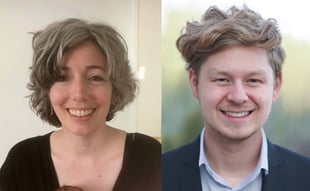

ANIMAFEST SCANNER X | SYMPOSIUM FOR CONTEMPORARY ANIMATION STUDIES | PANEL 1 – WHAT DOES ‘ANIMATION’ MEAN NOW?
REDEFINING ANIMATED FRAMES FOR VIRTUAL ENVIRONMENTS Franziska Bruckner (St. Pölten University of Applied Sciences, Austria) Julian Salhofer (St. Pölten University of Applied Sciences, Austria)
PANEL 1: WHAT DOES ‘ANIMATION’ MEAN NOW?
Theatre &TD
06/06 TUE 11:50-12:20
In film theory, the term ‘frame’ has been instrumental in describing single images on film strips. At the same time, ‘framing’ defines the edges of a film frame to select and compose an image (Bordwell/Thompson 2004). This extends to the ‘frame-by-frame’ definition for analog animation techniques (e.g., Furniss 1998), to ‘keyframes’ for explaining the workflow of cel animation, and later, digital animation techniques. Finally, the ‘between’ of ‘each frame’ that is ‘more important than what exists on each frame’ (McLaren c.f. in Sifianos 1995) has been a source of fruitful discussion within animation studies. But how should those definitions be extended to work for virtual environments? Through experimental combination with virtual reality, the art-based research project VRinMotion investigates how elements of analog stop-motion animation and motion-capture data sets can be transformed into extended animation concepts. Therefore, the project team consisting of artists, technicians, and theorists has developed hybrid artistic tools and workflows to creatively find, advance, and establish novel prospects of those techniques in virtual settings. The talk will focus on the outcomes of the first two parts of VRinMotion, namely ‘ExperiMotion 1 – 2D object and replacement animation’, which was developed together with artists Max Hattler and Sune Petersen, and ‘ExperiMotion 2 – experimental puppeteering’, which was established with artists Friedrich Kirschner and Loeoni Voegelin. Both experimental setups also explore and contextualize questions about ‘frames’, ‘framing’, ‘frame rates’, and the ‘in-between of frames’ in combination with spatiality, perception, and innovative virtual time-space relationships such as: How can spatiality in a virtual environment be generated with a ‘frame-by-frame’ animation technique that is flat in and by itself? What are the possible roles of (generated) stop-motion loops in an animated virtual live performance? What can an experimental manipulation or puppeteering of a virtual space-time look like?
Franziska Bruckner is a senior researcher at the Research Group Media Creation at the St. Poelten University of Applied Sciences. Her education includes master’s degrees at the University for Applied Arts Vienna and the University of Vienna, where she worked as a University Assistant from 2009 to 2013 and earned her doctorate in 2017. Her research focuses on animation history and analysis, animation in AR/VR environments, and climate change communication. Currently, she is the head of the projects VRinMotion (FWF), AniVision (FWF), and Climate Media Frames (GFF NÖ).
Julian Salhofer is a junior researcher at the St. Pölten University of Applied Sciences in the Media Creation Research Group at the Institute of Creative\ Media/Technologies (ICMT). He received a bachelor’s degree in Media technology and Design and a master’s degree in Digital Arts at the University of Applied Sciences Upper Austria. His current fields of study are animation and virtual reality. He is interested in animation, 3D design, interactive media, and sound design.


